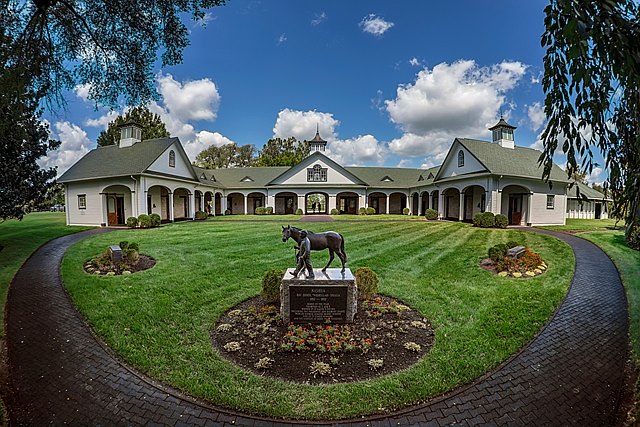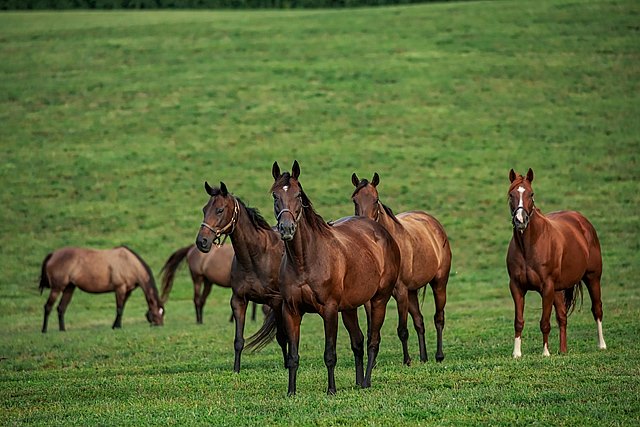Farms File Lawsuit Challenging Cap on Mares Bred


Three of Kentucky's biggest stud farms filed a lawsuit Feb. 23 challenging The Jockey Club's rule to restrict Thoroughbred stallions from breeding more than 140 mares each year—the so-called "stallion cap."
The complaint, filed in the U.S. District Court Eastern District of Kentucky, Central Division in Lexington, names The Jockey Club, Kentucky Horse Racing Commission chairman Jonathan Rabinowitz, and KHRC executive director Marc Guilfoil as defendants. The suit argues KHRC has unlawfully delegated power to The Jockey Club, and that the new rule breaches the constitutions of Kentucky and the United States as well as federal and state antitrust laws.
The Jockey Club announced its new Rule 14c amendment of the American Stud Book rules and requirements May 7, 2020, to address a declining and concerning degree of diversity within the Thoroughbred gene pool. Declining genetic diversity has been linked by one study to a trend since 1996 of stallions breeding books of well over 100 mares. In 2007, 5,894 mares (9.5% of the total) were bred by stallions who covered more than 140 mares. By 2019, 7,415 mares (27% of the total) were covered by stallions with books of more than 140, a threefold increase, according to The Jockey Club's report of mares bred statistics.
The rule change, which begins with stallions foaled in 2020, limits the number of mares that can be bred to a stallion in a calendar year to 140. For stallions born in 2019 and earlier, there continues to be no limit to the number of mares reported bred in the United States, Canada, and Puerto Rico, according to previous BloodHorse reports.
MITCHELL: The Jockey Club Adopts Cap of 140 Mares Bred
The KHRC issued the following statement regarding the lawsuit: "The Kentucky Horse Racing Commission is aware of this lawsuit, and our legal team looks forward to addressing these issues in the litigation process. We have no additional comment at this time, due to the Kentucky Horse Racing Commission's policy about not commenting on pending litigation."

The plaintiffs in the complaint are Spendthrift Farm, Ashford Stud (under the name Bemak N.V.), and Three Chimneys Farm. The plaintiffs characterized the stallion cap in a news release as a "blatant abuse of power" by The Jockey Club. The suit argues that the rule change is "arbitrary" and "anti-competitive" and will reduce access or drive up prices for many owners of mares looking to access top stallions. The rule also risks driving the best stallions overseas, according to plaintiffs, as no other country with a Thoroughbred stud book imposes a cap.
The plaintiffs also believe The Jockey Club's action will have a significant impact on the entire economic structure of the industry by undermining the value of Thoroughbreds throughout the United States, with a consequential impact on jobs and livelihoods. In addition, it places artificial restrictions on breeders' abilities to decide for themselves the best course of action for their stables.
"The refusal of The Jockey Club to register a Thoroughbred completely devalues that horse on the open market, because it cannot run in Thoroughbred races or breed other Thoroughbred racehorses," the lawsuit states. "As a result, the highest quality Thoroughbred horses will be bred less times than market economics would otherwise dictate. Hundreds of millions of dollars of stud fee revenues will be impacted; all owners of mares will pay higher prices to breed their mares; and less well-connected owners of mares will be precluded entirely from access to high quality stallions."
The Jockey Club issued a statement Tuesday defending the rule change as reflecting the registry's goal to preserve the health of the Thoroughbred breed for the long term.
"The Jockey Club publicly proposed a draft rule in September 2019 and received many thoughtful comments, which the stewards carefully considered in formulating a rule that will promote diversity of the Thoroughbred gene pool and protect the long-term health of the breed," the statement said. "Because the rule applies only to stallions born in 2020 or later, any effect on future stud fees or breeding economics is speculative. The Jockey Club stands by the rule and its purpose, which is to preserve the health of the Thoroughbred breed for the long term. The Jockey Club will continue to maintain the Principal Rules and Requirements of The American Studbook in keeping with its mission to ensure the health of the Thoroughbred breed."
Some studies have indicated a troubling trend toward declining diversity, but the plaintiffs' lawsuit argues there is "no scientific basis" to support The Jockey Club's position that the rule change is necessary for the health of the Thoroughbred breed or to promote genetic diversity. Plaintiffs take the position a cap simply means excess demand will move on to the less desirable, less commercial stallions, making it more difficult for breeders to be profitable. Some breeders have reportedly stated the new rule will lead them to simply get out of the business rather than tolerate it, according to the plaintiffs. No other country has seen a basis for introducing a cap, and the plaintiffs believe such a fundamental change cannot be taken unless supported by robust scientific evidence.
Forty-two stallions in the 2020 season bred 140 or more mares and among these stallions, 12 bred 200 or more mares. Ashford's Uncle Mo topped the list by mares bred at 257 followed by Spendthrift's Into Mischief at 248. Among the 12 stallions, Ashford Stud stands six of them with an average book size of 233 mares, while Spendthrift stands four that averaged 224 mares bred in 2020.
The statement from the plaintiffs also took exception to how the rule was adopted, claiming The Jockey Club board of stewards made its decision without discussion or a vote at the The Jockey Club's annual general meeting. Plaintiffs also allege The Jockey Club stewards making the decision had "clear conflicts of interest given they also represent or own various breeding and racing entities that stand to benefit now that owners of mares are being denied their first-choice stallions."

Commenting on behalf of the plaintiffs, Spendthrift Farm owner B. Wayne Hughes said:
"The introduction of the stallion cap by The Jockey Club is a blatant abuse of power that is bad law, bad science, and bad business. A handful of individuals from a private club in New York have been allowed to make a decision that will negatively impact the future of Thoroughbred racing and breeding both in Kentucky and the whole country.
"We have filed this complaint to defend the industry from anti-competitive, un-American, and arbitrary decision making that is not based on scientific evidence. If they can limit the number to 140, what's to stop them from limiting it to 100 or 80 or any other number down the road? What if your mare isn't one of the 140? We are really concerned about the small breeder's ability to survive this."
The lawsuit argues the actions of The Jockey Club and KHRC breach sections 1, 2, 3, 8, and 29 of the Constitution of the Commonwealth of Kentucky, which are designed to protect property rights and limit delegations of power by governmental bodies to private entities. In addition, it states the stallion cap violates the due process and equal protection rights of the three stud farms as guaranteed by the Fifth and the 14th Amendments to the U.S. Constitution. The suit also argues the rule violates the Sherman Antitrust Act and suppresses competition.
